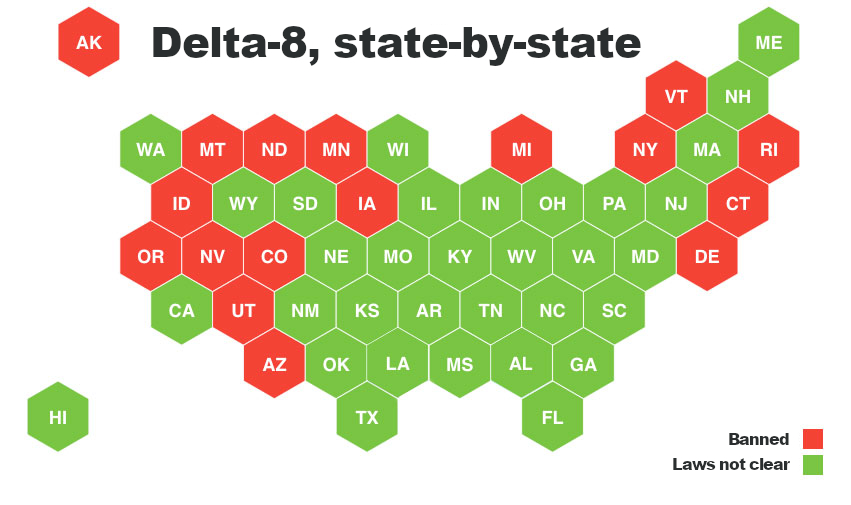More state governments are joining the growing chorus that would ban synthetic, hemp-derived delta-8 THC, with Arkansas, West Virginia and Texas the most recent to take such measures under consideration.
If the bans are implemented, those states would join 15 others that have explicitly outlawed delta-8 – and intensify the struggles for a CBD industry that is already reeling.
With an estimated 75% of the current supply of CBD going into the production of unregulated delta-8 products, the growing clampdown is sure to mean more attrition in the CBD sector, where demand for over-the-counter CBD oils and other products did not reach inflated expectations and an oversupply of raw materials back down the supply chain caused hemp biomass prices to plunge by as much as 90% over the past three years.
Clamping down
The Arkansas bill would “prohibit the growth, processing, sale, transfer, or possession of industrial hemp that contains certain delta tetrahydrocannabinol substances” and put delta-8, delta-9 and delta-10 THC on the state’s list of narcotic substances. The Arkansas Department of Health is reported to already be working on a clarification to its controlled substances list.
A sweeping bill in Texas seeks to clarify that all synthetically produced THC is illegal, and prohibits sales of all “consumable hemp products containing cannabinoids to consumers.”
And in West Virginia lawmakers have proposed a ban through a bill its misguided authors say “will immediately protect our children and deal with what many call ‘the next opiate crisis’” – an alarming stretch by any measure. The bill was introduced in the State House of Delegates this month, after previously being passed by the State Senate.
Safety concerns behind bills
State lawmakers across the U.S. have focused on safety concerns as delta-8 products have proliferated. Studies have shown some products to be rife with contaminants, inaccurately labeled, and marketed in manners that could be appealing to children.
Virginia and Kentucky also recently floated laws that would ban delta-8. In Virginia, such a measure is now awaiting the signature of Gov. Glenn Youngkin, while lawmakers in Kentucky are debating a revived bill that failed to pass the legislature last year.
It’s in Virginia where stakeholders are most immediately at risk after lawmakers in both houses of the legislature approved a highly restrictive bill. In addition to banning delta-8 THC, the bill contains provisions that would also outlaw many non-intoxicating CBD products, and other onerous regulations.
Other states
The Kentucky Department of Agriculture in 2021 declared delta-8 an illegal drug at both the state and federal levels, and is now looking at a ban. Sponsors of the bill in that state say they worry about the long-term side effects of delta-8. Stakeholders fear the measure could also lead to a ban on non-intoxicating full-spectrum hemp products.
The California Cannabis Industry Association late last year called for federal legislators to close the delta-8 loophole to avert a potential public health disaster represented by delta-8 THC, noting many such products are frequently adulterated. Other state stakeholder groups have also called for reining in the compound.
And a proposed measure in New Jersey would give the state’s Cannabis Regulatory Commission, which regulates the recreational marijuana market, authority over delta-8 THC.
A few states, including New York, Michigan and Oregon, allow delta-8 products to be sold under marijuana laws and regulations through state-approved distribution channels. Some states that have not yet addressed the compound could follow that path.
Lowdown on d-8
Delta-8 THC naturally occurs in hemp but only in trace amounts. But producers, taking advantage of a loophole in current laws, have turned to the laboratory to make products with higher concentrations by putting hemp-derived CBD through a synthetic process.
Federal lawmakers failed to account for such synthetic forms of CBD-based THC when they legalized hemp through the 2018 Farm Bill.
“Legislation, especially legislation that addresses new products or rights in an emerging industry, rarely gets everything right and ensuing fix-ups by amendments to the legislation or regulations result,” said attorney Sanford Stein of cannabislaw.com.
Pro & con
Producers have argued that because the 2018 Farm Bill made hemp and its downstream products legal, delta-8 is therefore also legal. A U.S. appeals court last year upheld that view under a strict interpretation of the 2018 Farm Bill, but noted it was most likely an oversight by lawmakers, who can correct that situation in the 2023 Farm Bill or with other legislation.
Opponents of delta-8 suggest the 2018 Farm Bill never intended hemp to be used to make psychoactive compounds and that nefarious players are exploiting the bill’s language to sell highly potent synthetic THC products that are widely available at retail.
“The farm bill is up for reauthorization in 2023 and there is little doubt that Congress will address the loophole with a fix-up or interpretive amendment,” Stein said. “Industry lobbying should help Congress get it right, though.”
Nothing wrong with delta-8
“If done right that is a good and mature approach to laws and regulations. In the cannabis industry, however, anything that looks like a ‘workaround’ – and d-8 is just that – taking an obscure and not well-understood provision of the law and driving a truck through it, poisons an otherwise measured and reassuring approach to CBD use.”
The U.S. Food & Drug Administration (FDA) has also expressed alarm over delta-8 THC products, calling the rapid growth “extraordinarily concerning.” The U.S. Drug Enforcement Administration asserted last month that delta-8 and other forms of hemp-based synthetic THC do not meet the federal definition of hemp and are therefore controlled substances.
“The approach now should be a uniform state response and support for CBD oils and products that are established and proven safe,” Stein said, adding: “If properly processed, what’s wrong with Delta 8 THC?”

